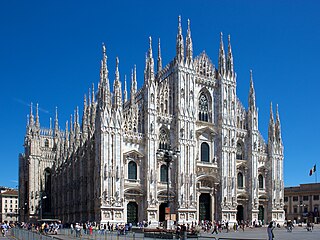
A church, church building, or church house is a building used for Christian worship services and other Christian religious activities. The earliest identified Christian church is a house church founded between 233 and 256.

A temple is a building reserved for spiritual rituals and activities such as prayer and sacrifice. Religions which erect temples include Christianity, Hinduism, Buddhism, Sikhism, Jainism, Islam, Judaism, Zoroastrianism, the Baha'i Faith, Taoism, Shinto, Confucianism, and ancient religions such as the Ancient Egyptian religion and the Ancient Greek religion.
Presbyterianpolity is a method of church governance typified by the rule of assemblies of presbyters, or elders. Each local church is governed by a body of elected elders usually called the session or consistory, though other terms, such as church board, may apply. Groups of local churches are governed by a higher assembly of elders known as the presbytery or classis; presbyteries can be grouped into a synod, and presbyteries and synods nationwide often join together in a general assembly. Responsibility for conduct of church services is reserved to an ordained minister or pastor known as a teaching elder, or a minister of the word and sacrament.
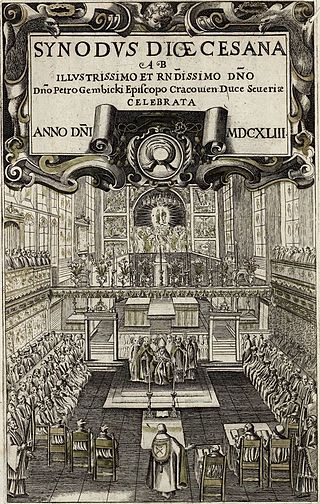
A synod is a council of a Christian denomination, usually convened to decide an issue of doctrine, administration or application. The word synod comes from the Ancient Greek σύνοδος 'assembly, meeting'; the term is analogous with the Latin word concilium'council'. Originally, synods were meetings of bishops, and the word is still used in that sense in Catholicism, Oriental Orthodoxy and Eastern Orthodoxy. In modern usage, the word often refers to the governing body of a particular church, whether its members are meeting or not. It is also sometimes used to refer to a church that is governed by a synod.
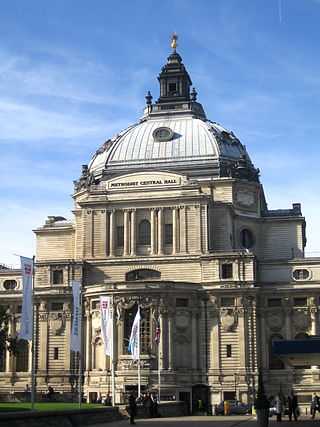
The Methodist Central Hall is a multi-purpose venue in the City of Westminster, London, serving primarily as a Methodist church and a conference centre. The building, which is a tourist attraction, also houses an art gallery, a restaurant, and an office building. It contains 22 conference, meeting and seminar rooms, the largest being the Great Hall, which seats 2,300. Central Hall also acts as an important spiritual and sacred place for Methodists.
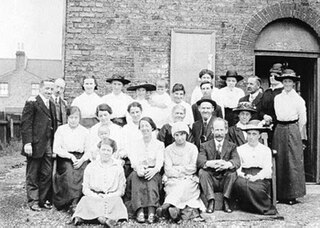
The Plymouth Brethren or Assemblies of Brethren are a low church and Nonconformist Christian movement whose history can be traced back to Dublin, Ireland, in the mid to late 1820s, where it originated from Anglicanism. The group emphasizes sola scriptura, the belief that the Bible is the only authority for church doctrine and practice. Plymouth Brethren generally see themselves as a network of like-minded free churches, not as a Christian denomination.

A place of worship is a specially designed structure or space where individuals or a group of people such as a congregation come to perform acts of devotion, veneration, or religious study. A building constructed or used for this purpose is sometimes called a house of worship. Temples, churches, mosques, and synagogues are examples of structures created for worship. A monastery may serve both to house those belonging to religious orders and as a place of worship for visitors. Natural or topographical features may also serve as places of worship, and are considered holy or sacrosanct in some religions; the rituals associated with the Ganges river are an example in Hinduism.

The Church House is the home of the headquarters of the Church of England, occupying the south end of Dean's Yard next to Westminster Abbey in London. Besides providing administrative offices for the Church Commissioners, the Archbishops' Council and the Church of England Pensions Board, and a chamber for the General Synod, the building also provided a meeting place for the Parliament of the United Kingdom during World War II, and for some of the organs of the newly formed United Nations afterwards, including the first meeting of the UN Security Council. It has more recently been the venue for several notable public enquiries.
A general assembly or general meeting is a meeting of all the members of an organization or shareholders of a company.
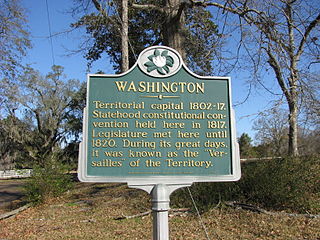
Washington is an unincorporated community in Adams County, Mississippi, United States. Located along the lower Mississippi, 6 miles (9.7 km) east of Natchez, it was the second and longest-serving capital of the Mississippi Territory.

Jefferson College, in Washington, Mississippi, at 16 Old North Street. Named in honor of Thomas Jefferson, the college was chartered in 1802, but did not begin operation until 1811. Jefferson College was founded as an all-male college but operated primarily as a college-preparatory school, and later became a military boarding school, which it remained for most of its history.

The Hub is a public arts and events building in the centre of Edinburgh, Scotland. Located at the top of the Royal Mile, it is a prominent landmark as its tall Gothic spire is the highest point in central Edinburgh, and towers over the surrounding buildings below Edinburgh Castle.

The moderator of the General Assembly is the chairperson of a General Assembly, the highest court of a Presbyterian or Reformed church. Kirk sessions and presbyteries may also style the chairperson as moderator. The Oxford Dictionary states that a Moderator may be a "Presbyterian minister presiding over an ecclesiastical body".

The General Assembly of the Church of Scotland is the sovereign and highest court of the Church of Scotland, and is thus the Church's governing body. It generally meets each year and is chaired by a Moderator elected at the start of the Assembly.
Gulfside Assembly is a Methodist retreat located in Waveland, Mississippi. It was founded to provide spiritual, educational and recreational facilities to African Americans who were denied access elsewhere because of segregation. Incorporated in 1924, it is today recognized as a historic site by the State of Mississippi.

Jennings Ligon Duncan III is an American Presbyterian scholar and pastor.

The Assembly Hall is located between Castlehill and Mound Place in Edinburgh, Scotland. It is the meeting place of the General Assembly of the Church of Scotland.
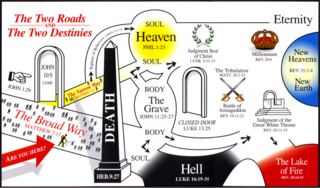
The Gospel Halls are a group of independent Christian assemblies throughout the world that fellowship with each other through a set of shared Biblical doctrines and practices. Theologically, they are evangelical and dispensational. They are a conservative strand of the Open Brethren movement and tend to only collaborate with other assemblies when there is doctrinal agreement.
Assembly hall may refer to:
The Open Brethren, sometimes called Christian Brethren, are a group of Evangelical Christian churches that arose in the late 1820s as part of the Assembly Movement within the Plymouth Brethren tradition. They originated in Ireland before spreading throughout the British Isles, and today they have an estimated 26,000 assemblies worldwide.
















